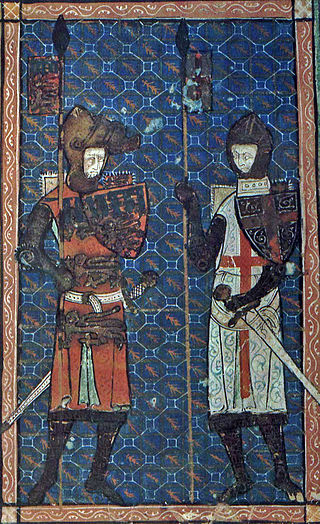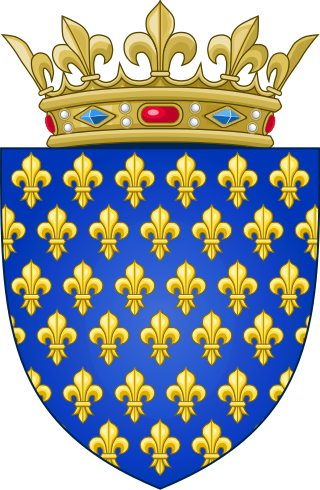Related Research Articles

Charles IV, called the Fair in France and the Bald in Navarre, was last king of the direct line of the House of Capet, King of France and King of Navarre from 1322 to 1328. Charles was the third son of Philip IV; like his father, he was known as "the fair" or "the handsome".

Thomas, 2nd Earl of Lancaster was an English nobleman of the first House of Lancaster of the royal Plantagenet Dynasty. He was Earl of Lancaster, Leicester, and Derby from 1296 to 1322, and Earl of Lincoln and Salisbury jure uxoris from 1311 to 1322. As one of the most powerful barons of England, Thomas was one of the leaders of the baronial opposition to his first cousin, King Edward II.

Earl of Leicester is a title that has been created seven times. The first title was granted during the 12th century in the Peerage of England. The current title is in the Peerage of the United Kingdom and was created in 1837.

Baron Athenry is one of the oldest titles in the Peerage of Ireland, but the date of its creation is thoroughly uncertain; each of the first four Berminghams listed below is claimed by some writers to have been Lord Athenry, but the evidence is disputed. The title appears to have been given to the de Birmingham family of Birmingham, Warks, England as a reward for their help in the Norman invasion of Ireland in 1172. Both Sir William de Birmingham, and his son Robert de Birmingham, are variously claimed to have been involved in the invasion, but it is probable that, after the invasion, William returned to his home in England and left Robert their new lands in Ireland.

The House of Capet ruled the Kingdom of France from 987 to 1328. It was the most senior line of the Capetian dynasty – itself a derivative dynasty from the Robertians.
Roger Damory, Lord d'Amory, Baron d'Amory in Ireland, was a nobleman and Constable of Corfe Castle.

Robert FitzWalter, 1st Baron FitzWalter was an English landowner, soldier, administrator and politician.

Colne Engaine is a village and a civil parish in Essex, England, situated just north of the River Colne and of the larger village of Earls Colne, approximately ten miles northwest of Colchester. The village takes its name from the river, around which it is likely that the earliest settlements were made, and the Engaine family, who were the principal family of the village between 1279 and 1367.
Events from the 1270s in England.

Margaret de Bohun, Countess of Devon was the granddaughter of King Edward I and Eleanor of Castile, and the wife of Hugh Courtenay, 10th Earl of Devon (1303–1377). Her seventeen children included an Archbishop of Canterbury and six knights, of whom two were founder knights of the Order of the Garter. Unlike most women of her day, she received a classical education and was a lifelong scholar and collector of books.

Gaynes Hall is a Grade II* listed Georgian mansion set in 20 acres (81,000 m2) of parkland in the heart of the Cambridgeshire countryside. Located in the village of Perry, Huntingdon the building was requisitioned during the Second World War and was also the residence of Sir Oliver Cromwell for 21 years.
Isabella de Beauchamp, Lady Kidwelly, Baroness Despenser, was an English noblewoman and wealthy heiress.
Alice de Lacy, suo jure Countess of Lincoln, suo jure 5th Countess of Salisbury was an English peeress.
William de Chesney was a medieval Anglo-Norman nobleman and sheriff. The son of a landholder in Norfolk, William inherited after the death of his two elder brothers. He was the founder of Sibton Abbey, as well as a benefactor of other monasteries in England. In 1157, Chesney acquired the honour of Blythburgh, and was sheriff of Norfolk and Suffolk during the 1150s and 1160s. On Chesney's death in 1174, he left three unmarried daughters as his heirs.

The Black Rose is a 1945 historical novel by Thomas B. Costain. It is a fictional story set in the 13th century about a young Saxon who journeys to the far-away land of Cathay in search of fortune. Included in this narrative are several notable figures: Roger Bacon, Bayan Hundred Eyes, Edward I of England and his consort Eleanor of Castile. Costain also includes a passage depicting the building of a galere da mercato at the Venetian Arsenal in a single day.
John of Monmouth DD was a medieval university Chancellor and Bishop of Llandaff.
Sir Baldwin St. George, of Hatley St. George, Cambridgeshire, was an English politician.

The feudal barony of Appleby was a feudal barony with its caput at Appleby Castle in Appleby, Westmorland, England.

John Botetourt, 1st Baron Botetourt was an English military commander and admiral in the 13th and 14th centuries.
Robert de Vaux, also known as Robert de Vallibus,, Baron of Gilsland, was a prominent 12th-century English noble, who served as Sheriff of Cumberland in 1175 and 1176.
References
- Cokayne, G. E. The complete peerage of England, Scotland, Ireland, Great Britain and the United Kingdom, extant, extinct, or dormant. Volume 5. 1926. pages 71-81.